#that hoopy frood
Text

47 notes
·
View notes
Text

quick towel day fit check 👍🏼
#towel day#h2g2#the hitchhiker's guide to the galaxy#extremely hoopy frood#the glorious 25th of may#my face
14 notes
·
View notes
Text

HAPPY TOWEL DAY, YA HOOPY FROODS
#towel day#hhgttg#h2g2#hitchhikers guide#the hitchhiker's guide to the galaxy#douglas adams#hoopy frood
20 notes
·
View notes
Text
Fun with Symbolism: Saitama as a "Wise Fool" Character
Saitama is a unique character for many reasons, least of all because of his explicit (if unusual) goal: he’s a hero not for fame or glory, but for fun. Because of the turbulent way that the Monster Association arc unraveled, this aspect of Sai’s personality has become a topic for debate—is he chasing glory, or merely fumbling towards some much-needed dopamine? Sometimes I feel like the subtext of OPM is really “people will really do 100 push-ups, 100 sit-ups, 100 squats and 10 K running before (or become the world’s strongest monster) before they will go to therapy.”
I would argue that while “being a hero for fun” doesn’t traditionally constitute Good Samaritan-ism, it does inoculate Saitama from the pitfalls of egotism and entitlement that plague his pro-hero colleagues. If Saitama was granted these unique powers by design, it likely has to do with his unconventional approach to heroism (or rather, his non-attachment to all the subsequent glamor and glitz). While he might seem a bit foolish, even juvenile at points, I've always considered him a wise fool: in literature, a character that is initially seen as silly or senseless, but eventually comes to demonstrate wisdom in their own unique (and usually humble) way.
When I think of Saitama and his ultimate power, I think back to the Ruler of the Universe (AKA “The Man in the Shack”) from The Hitchhiker’s Guide to the Galaxy series. How does one qualify for a position of far-reaching, inexhaustible power?
Simple: wish for literally anything else in the world.
Here’s an excerpt from The Restaurant at the End of the Universe that explains in more detail:
It is a well-known fact that those people who must want to rule people are, ipso facto, those least suited to do it. To summarize the summary: anyone who is capable of getting themselves made President (of the Universe) should on no account be allowed to do the job. To summarize the summary: people are a problem.
** In Adams' series, the President of the Universe holds no real power; the Presidency is a stooge role that exists solely to mollify and distract the ruthless, power-hungry people that desire to control everything, at the expense of anything (which often goes poorly, as we know from life on earth).
I have (half-jokingly) hypothesized that OPM happens inside a “Philadelphia”—a humorous concept proposed by playwright David Ives. In a Philadelphia, the Universe actively identifies what you most desire and then deliberately moves it away from you. For Ives, this is a running gag, but I think that in the OPM-verse, this same concept could be read as a statement on non-attachment.
Non-attachment is an a stepping stone towards Enlightenment in many major religions / belief systems, and there are plenty of references to Enlightened entities within OPM. Saitama is literally parting the sea and walking on water, and that’s not even getting into the various references to Hinduism/Buddhism, particularly with Garou but also Blast and Psykos.
But it’s very easy to lose track of what’s important, and to be distracted by all the wrong things, as Adams explains:
And so this is the situation we find: a succession of Galatic Presidents who so much enjoy the fun and palaver of being in power that they very rarely notice that they are not.
Being a hero isn’t fun for Saitama; that’s probably how we know he’s doing it right.
Saitama is a simple man with a relatively straightforward goal ("to have fun"), and I think there's something refreshing about his brutal honesty.
Much like Adams’ Ruler of the Universe, Saitama’s not one for lofty concepts ("twenty words or less!"). Similarly, despite commanding the entirety of the known cosmos, the Ruler of the Universe only focuses on what’s in front of him (this is from the Hitchhiker's fandom wiki):
[The Ruler of the Universe] has an odd, solipsistic view of reality...He has a very dim view of the past, and he only believes in what he senses with his eyes and ears (and doesn't seem too certain of that, either): anything else is hearsay, so when executive-types visit to ask him what he thinks about certain matters, such as wars and the like, he tells them how he feels without considering consequences.
And I think that while this is a frustrating position to take, it’s also an honest one: sometimes the answer is, “there is no (good) answer” or “I know that I know nothing” (also known as the Socratic Paradox, not actually said by Socrates) but people tend to hate it when you point that out.
Because at the end of the day, what is justice and what is evil? Pfft. Who knows, man. The only reality is sale day and sweet, misguided kids in weird costumes.
Tackling macro-problems (like world peace) requires us to zoom out, which may cause us to lose touch with reality—often in ironic and unfortunate ways. In this way, Garou serves as a foil for Saitama. Think of their interaction with Tareo: when Tareo begins to shed tears of concern for the rapidly-monsterizing Garou, Garou assures the boy that his actions are ultimately for the best—by becoming Ultimate Evil, he can create a world where no children cry. And if Garou took a good, hard look around him, he would realize that Tareo is sobbing not because of hypothetical bullies in Garou's imagined example, but because of what Garou is doing right now. This is a prime example of the “finding a good reason” fallacy that plagues pretty much everyone in the OPM-verse (but Garou in particular).
But. despite his lofty concepts, Garou is still looking at the world upside-down and backwards. In contrast, Saitama immediately identifies what’s important now: praising the little kid standing up to defend the monster (Tareo, but Garou by extension), foreshadowing the importance of anchors for impossibly stubborn strong people like them. Much like the Ruler of the Universe will redirect high-level conversations to the things he can see and touch, this approach solidifies (for me) Saitama's standing as a Wise Fool. More context from Wikipedia:
The wisdom of the fool often captures what Intellectualism (logic and reasoning) fails to illuminate of a thing's meaning or significance; thus, the wise fool is often associated with the wisdom found through blind faith, reckless desire, hopeless romance, and wild abandon, but also tradition without understanding, and folk wisdom.
There are pros and cons to Sai’s approach, and you could even argue that he botched this interaction with Garou, but put a pin in that thought, we’ll come back to it.
Desire is insidious, and heroes in the OPM-verse desire not just power but recognition. Think of common synonyms for hero: star, legend, celebrity, idol, favorite, VIP, darling… there’s a reason you’re not supposed to meet yours.
Practicing non-attachment is the key to living a good life according to many religious beliefs / spiritual practices. This includes non-attachment to non-tangible things like recognition, as well as tangible things like wealth and food.
Thinking about non-attachment brings me back to a lecture I attended at the Integral Yoga Institute, which focused on the 3 granthis (the knots of the heart that prevent us from reaching enlightenment), and the speaker specifically emphasized that being selfless included non-attachment to outcomes. Simply put, are you prepared to be a good person even if your efforts fail? Even if you never receive recognition--or worse? Even if you're punished for doing the right thing?
Overcoming the need for recognition is necessary to maintain one’s moral compass, because doing the right thing is damned hard. The Good Place, where characters grapple with the idea of "Moral Dessert": the idea that if you act with virtue, you deserve a reward (and the source of many, many stomach aches for poor Chidi—who argues that good deeds don’t “count” if they are not freely given.)
What truly matters, then, is how you treat others when nobody is looking—and Saitama often goes a step farther during his battle with the Sea King (by “announcing” that he was a weak, C-class hero taking credit for his colleagues’ hard work)... or even now, amazingly, even with Genos singing his praises Saitama seems entirely uninterested in the laudable deeds he did. Partly because Genos is being very Genos about it (bless my curmudgeonly-yet-emphatic toaster son), but Saitama is also the kind of guy that knows how to touch grass when he needs to. That was key yo the last arc.
It’s important to stay detached from recognition or results because taking up the Wise Fool/Holy Fool mantle might include enduring mockery/humiliation for doing the right thing, like shirking recognition in favor of the greater good, or living a simple life in the service of others.
…For the record, though, “non-attachment to recognition” is very different than demanding a fair/transparent salary system from your employer, as is the case with the Hero Association.
Anyway, other "Wise Fool" characteristics that Saitama demonstrates:
blind faith (in his exercise regime as the source of his power)
unexpectedly wise and insightful (Saitama is perceptive and canny—able to assess characters like Garou/Fubuki/King accurately and astutely, almost immediately upon their first meeting—but he is often coy about how much he knows)
unassuming and innocent seeming
These last two points (insightful but unassuming) are important—while Saitama’s character observations are usually accurate, they are often blunt and rather tactless— but gets away with it, because he seems Mostly Harmless. When the Fool Character appears in a story, this is usually their primary responsibility—to speak scary or unpleasant truths in a more palatable way. This may also be why even though Saitama is the protagonist, we spend so much time around people who are not Saitama… so we can see how his simple truths have changed them.
Playing fetch with Fire-Breathing dogs, taking a spa-day in magma… Saitama finds joy in everything, maybe too much joy. That’s the flip-side of being a fool: immaturity.
The Fool is (usually) the first card in the Tarot deck for a reason. It is number Zero (the number of infinite potential) and does not actually have a set place in the deck--as the whole deck is meant to symbolize the fool's journey. However, it is often placed first. The most common imagery probably comes from the Rider-Waite deck:
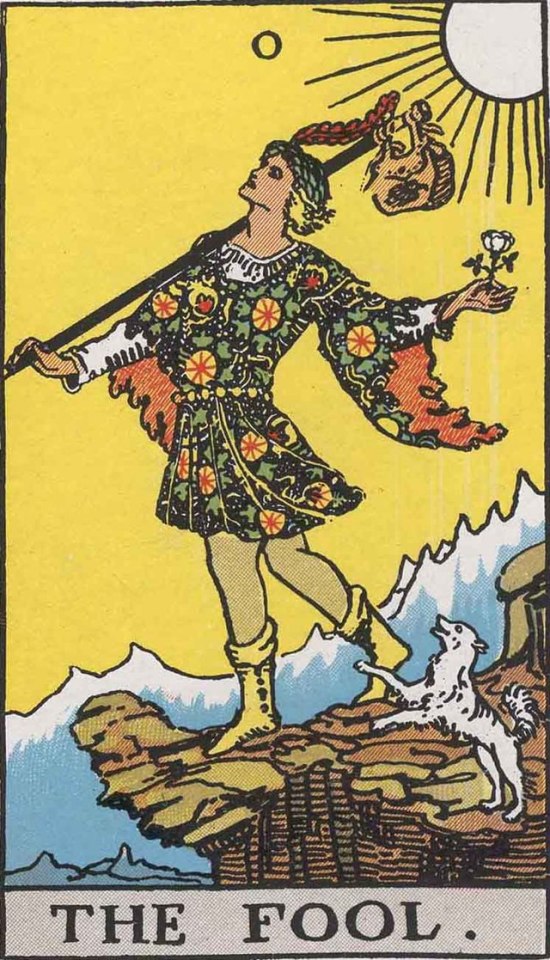
Poor guy’s about to walk off a cliff— is he feckless or fearless? Poor (in pocket) or rich (in spirit)? The answer is both. I've included an excerpt from one of the books in my library (with some interjections). The source is Tarot by Jessica Hundley--it's part of Taschen's Library of Esoterica and it's really gorgeous (a nice coffee table piece!). Anyway, the chapter reads:
The fool marks the beginning of the journey through the Major Arcana. Often depicted as a young person, he is usually shown walking precariously close to a cliff or deep ravine, sometimes with one foot poised, as if he is about to step directly into the void, yet he remains blissfully unaware of his imminent danger (like when Saitama is challenging Garou to what seems like an lighthearted fight). His clothes and cap are vividly colored, often in blues, reds, and yellows, and at times emblazoned with symbols. With one hand, he carries his belongings, wrapped up in a kerchief tied to the end of a staff (or maybe a bucket), casually slung over his shoulder…At his feet, a small dog (ROVER) or other small animal is often shown, a protector and loyal companion on the Fool’s adventure. Beyond are the sun and the snow-capped mountains, signifying his ultimately destination ahead, a mystic path towards enlightenment.
Attributes
The fool is a nascent spirit embarking on a search for experience. He emerges from the void and sets out on his journey with the innocence of a newborn. His story has yet to be told, he is infinite potential—all things and no thing, at once. He is not yet rational, but rather intuitive, acting entirely on instinct.
Obviously, Saitama's perceived lack of hero instincts have come up, but without getting into detail—I would argue that recognizing/understanding/incorporating our instincts into reasonable thought is part of our journey towards being better humans. Getting back to it, though:
…Naive, spontaneous, a blank page awaiting the first touch of ink, he has no expectations, no past. He is rash, obsessed, and unrestrained. He is energized and continually renewed by his own inception, propelled forward by impulse and cathartic creations.
So we have a through-line of Fools and Enlightenment, walking together hand-and-hand. The forward to this chapter quotes Learning Tarot Essentials (Paul Foster Case), and it’s absolutely beautiful so I’ll share that too--although it's a bit more esoteric and meta than Hundley's explanation:
The cosmic Life Breath is forever young, forever in the morning of its power, forever on the verge of the abyss of manifestation. It always faces unknown possibilities of self-expression and transcends any height it may have reached at a given time. He is the primary aspect of universal consciousness, which we term Super consciousness. Because he symbolizes the state of the Life power just prior to beginning a cycle of the self-expression, also represents inexperience. It is because of this inexperience that the noble wise men who invented the Tarot called this trump card ‘The Fool’— Finally, the title of the Zero card refers to that “foolishness of God, which is wiser than men."
That bit about "foolishness of God" is from 1 Corinthians, and I would argue that the full quote is more about hubris / inability of mortals to grasp the divine, but I'm a theology enthusiast, not an expert and most of what I know about Bible comes from Apocrypals.
Anyway, I know that was a lot, so I’ll leave with one of my favorite articles about Michelangelo’s David: the author, Sam Anderson, describes how The David—masterpiece, hero, epitome of perfection—is everywhere in Florence. Initially, Anderson is inspired by the statue—but he’s inspired to be perfect, something that he can neither achieve nor maintain (and, as the article reveals, even the David has cracks in its ankles—“a hero’s destiny is not to stand but to fall,” Anderson writes). In later life, Anderson finds the real hero of Florence to be Dostoevsky’s Prince Myshkin. Dostoevsky wrote The Idiot while living abroad in Florence. The protagonist (another Wise Fool / Holy Fool character) grapples to maintain purity of heart in an uncertain and confusing world.
I love this deliciously messy concept—a fool of a hero—because it’s relatable. Although accomplished. Saitama doesn’t speak to what could be as much as he speaks to what we are now, which is arguably more important.
#one punch man#opm#opm meta#meta#saitama#esoterica#tarot#armchair theology#in this essay i will#douglas adams is a hoopy frood who knows where his towel is
58 notes
·
View notes
Text
Oh hey, HAPPY TOWEL DAY EVERYONE!!!!!
3 notes
·
View notes
Text
So yesterday was my big brother birthday, so in honor of him I'm posting a picture I did last year.
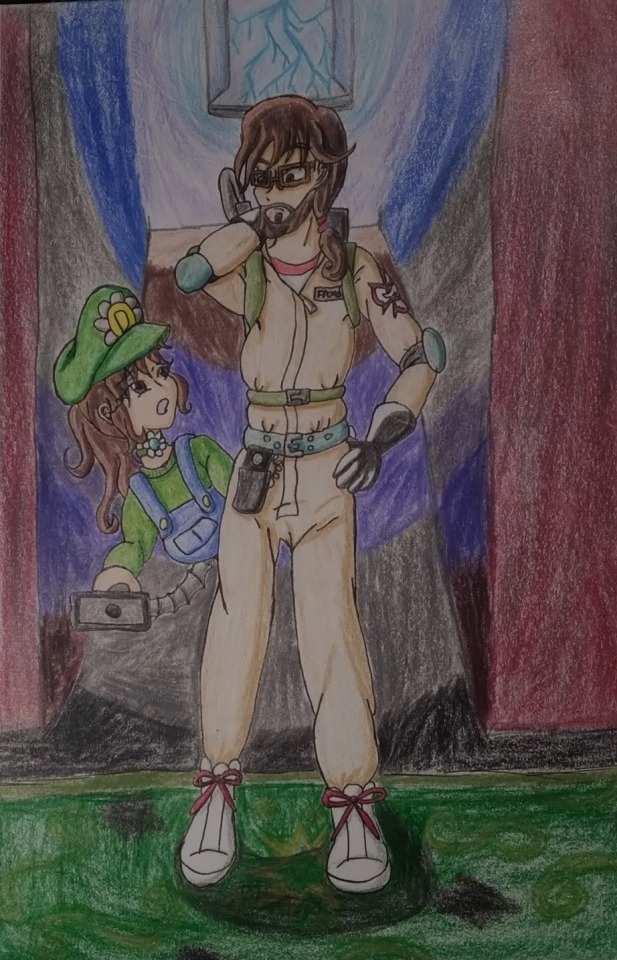
~walking down a spooky hallway when suddenly a crash of lightning blows open the windows & blows out the candles in the hall. "Ahhhh!"
Hoopy with a sigh turns around to look at Daisy who is now hidden behind him.
Daisy peering up from behind him & looks up "what? that was loud."
with another disappointed sigh he ask "Remind me why did I take you with me?" Daisy replied " Chibi is busy mowing down demons in West Virginia."
he let's out another sigh & says "okay let's do this ghostbusting style."~
so Luigi's Mansion for the GameCube is the only horror game i have played (Amy's story in Sonic adventure is horror adjacent) my brother played Ghostbusters for Wii & wait for me so i could watch him play.
and anytime he wanted to play two player he would ask @chibitoymaker to play cuz I'd cross the streams. XD
ps. The Chicago branch patch is on his suit.
#my art#fanart#Ghostbusters#luigi's mansion#Chicago branch#silent hill#Hi I'm daisy#Hoopy Frood#the hitchhiker's guide to the galaxy#that's one hoopy frood#love you bro#spooky
2 notes
·
View notes
Text
happy towel day!
0 notes
Note
Rita, why are you such a cool nerd?

"I'm a what?"
1 note
·
View note
Text


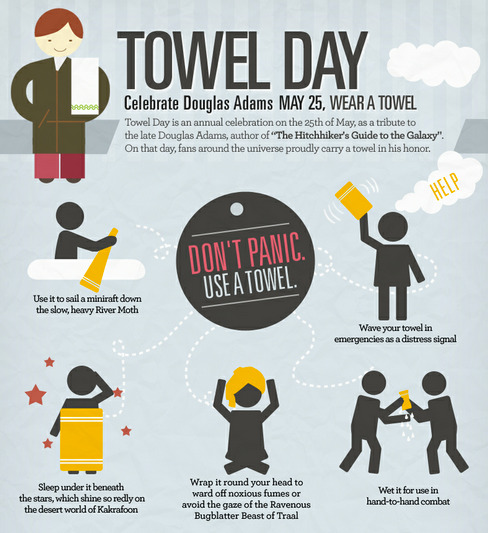

All right all you Hoopy Froods grab your towels, and be ready to celebrate the man who taught us just how useful they could be.
2K notes
·
View notes
Text
well it's may 25th again so I expect all you hoopy froods to know where your towels are
130 notes
·
View notes
Text
HITCHHIKER'S GUIDE TO DIRK GENTLY: ALL THE HITCHHIKER'S GUIDE REFERENCES I'VE NOTICED IN DIRK GENTLY'S HOLISTIC DETECTIVE AGENCY (a.k.a. everything is connected)
(spoilers)
this took a good couple of hours and I tried to do this in order; buckle up!!
SEASON 1:
the posters on the windows as todd is walking by the convenience store place has a silhouette of a falling whale, what I assume is a reference to the infinite improbability drive whale, and an ad that says "zaphod," a reference to zaphod beeblebrox (s1e01 'horizons')
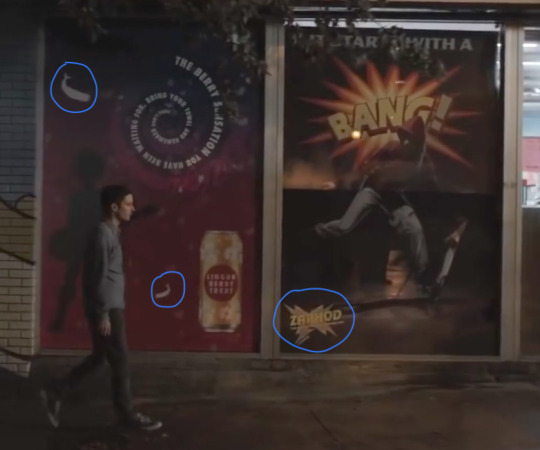
(also todd's stance here is so funny to me)
the rowdy 3, consisting of four (and later five) members, could be a reference to how the hitchhiker's guide to the galaxy is called a trilogy that happens to consist of 5 books ("there are four of them!" "I'm wildly aware")
one of the screens in the death maze has the number 42 on it (s1e04 'watkin')

SEASON 2:
there are 42 blackwing subjects
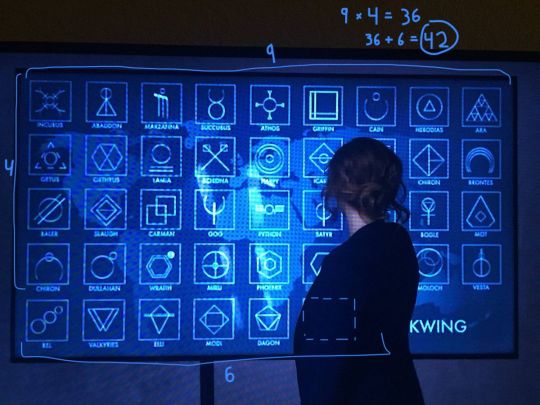
farah's awesome jacket with "D Adams" on it and the number 42 (multiple episodes)
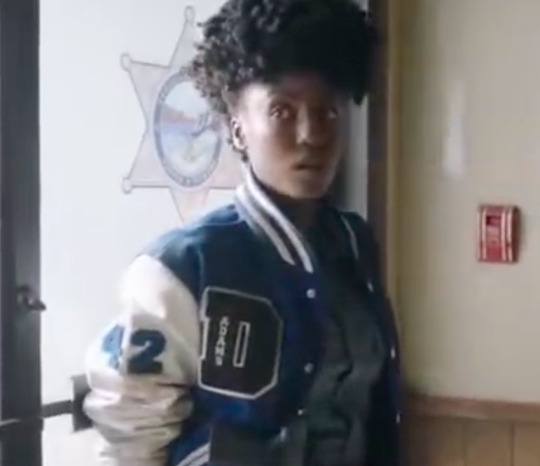
the boretons' dog is named agrajag, which is the entity that arthur dent accidentally kills in every incarnation. unfortunately he dies here too (multiple episodes)
in the tree car, farah remarks that "the odometer's only on 42 miles" (s2e02 'fans of wet circles')

the book francis cardenas has by him as he's having the nightmare that says "PANIC!" on the cover (in what can only be large, unfriendly letters), with the subtitle "attack devil dolphins." (s2e07 'that is not miami')

the executioner guy in wendimoor calling dirk a "hoopy frood" as he helps him unload the scissor blade things (s2e08 'little guy, black hair')
the blackwing phone number on the business card, "555-424-2424" with a wild amount of 42s (s2e09 'trouble is bad')
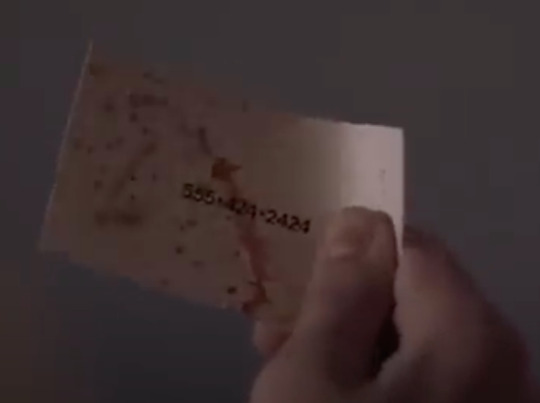
dirk telling himself "don't panic" before jumping into the portal (s2e09 'trouble is bad')
#hitchhikers guide#the hitchhiker's guide to the galaxy#dirk gently's holistic detective agency#dirk gently#dghda#douglas adams#42#dghda details
203 notes
·
View notes
Text

Happy Towel Day, ya hoopy froods! Everything will be 4️⃣2️⃣ Don't panic, stay safe and always know where your towel is👍May the Great Green Arkleseizure's blessing be upon you!
#towel day#douglas adams#42#don`t panic#dont forget your towel#h2g2#the hitchhiker's guide to the galaxy#ukrainian artist#украрт#укртумбочка#also I'm posting it during an air alert in Kyiv
58 notes
·
View notes
Text
Just a lil Royai fic rec.
I'm new to the FMA fandom, but these two now live in my head rent-free. And so do these fics. Enjoy!
Catharsis by kekkubean
Rating: M
Word count: 5K
Summary: She knew better. And now a little girl was dead because she wanted to believe that her father’s behavior existed in a vacuum.
Or,
When Riza learns of the Tucker incident, she doesn't handle it well.
Excerpt: At her feet, Hayate whined, she imagined disapprovingly. It was definitely too early to be drinking, although thankfully she skipped training him on understanding the appropriate hours for alcohol consumption. Riza met his gaze and they regarded each other for a moment as the burning subsided slowly. Hayate cocked his head to the side, curious, and whined again softly, as if he could read her wretched mind.
She briefly, morbidly wondered if Alexander and Nina shared thoughts, or if one of their minds dominated the other in that body, or if it were an entirely new—
Riza slammed her palms on the table, instantly suppressing the thought, and abruptly pushed herself up to standing. Hayate jumped and slinked off into her bedroom. She stood swaying for a moment, trying to gain her balance and some semblance of her sanity.
My thoughts: This one is canon to me. I can offer no higher praise for a fic. Before reading this, I never considered how Nina's fate might affect Riza, but it just makes so much damn sense. The way kekkubean writes trauma is blade-sharp. And the pacing, the dialogue, the characterization - exquisite.
Anytime by myrhymesarepurer
Rating: G
Word count: 838
Summary: It was not his Captain standing there in front of him. It was his master's daughter, so brutally burdened with ink, secrets so cruelly exposed to the world by one blasted broken zipper.
Excerpt: She lifted her head and blinked, feeling a great bit foolish
that she stood in front of her superior, tortured over an issue
he managed to solve in,
oh,
less than one second.
How very Roy Mustang.
My thoughts: I've read this so many times. It's one of the first I read in this fandom, and I keep coming back to it. It's short, poetically formatted, and utterly perfect in it's simplicity.
Beautiful People by That Hoopy Frood
Rating: T
Word count: 6.4K
Summary: Soon after the conclusion of the Ishvalan Civil War, Captain Maes Hughes receives a phone call in the middle of the night. The message is short, concise... and perhaps the most terrifying thing Hughes has ever heard.
Hawkeye's apartment. Now. Come alone. Someone has been hurt.
A promise was once made amidst the sands of a distant desert land: oaths will be upheld, and secrets will be scorched away. The sinful had waited too long; Roy Mustang was indebted to his promise, and Riza Hawkeye had come to collect.
Shut the door; it's starting to rain.
Excerpt: "You asked her to follow you… she would have walked over burning coals for you…" Hughes felt hot, angry tears running down his face. His glasses fogged. His voice cracked. "You were supposed to fall in love with her, Roy! You were supposed to marry her and have kids and be just be happy for once in your goddamned miserable life… now look what you've done. Look at what you've done."
My thoughts: Riza's back-burning is one of the most starkly absent scenes from the FMA canon. The scene has been written and rewritten in fanfiction many times, but this particular fic fills the gap in a way that is just perfectly brutal and raw. The addition of Hughes' presence makes the whole thing cut like a knife. Like Catharsis, this one is canon in my mind.
And now, a shameless plug:
The Counteroffer by theblueeyedfirebender
Rating: T
Word count: 2.6K
Summary: On the eve of Mustang’s inauguration as Fuhrer, Riza Hawkeye submits her resignation.
Excerpt: He pulls a manila envelope from the drawer and stands, sliding it across the surface of the desk in her direction. Her gaze falls to the hand he’s extended, long fingers and pale skin, the lingering scar of a transmutation circle still faintly visible, crosswise marred by another, thicker scar, twin to one on his other hand.
Something snags in her throat, but she swallows it down and picks up the envelope. It’s thin, like it contains nothing at all. “What is this, sir?”
For a moment, he doesn’t answer, as if the routine honorific has stuck him somewhere unexpected. When he speaks again, his voice is thick. “A counteroffer.”
My thoughts: My first-ever FMA fic, complete with an ACOMAF Chapter 54-inspired confession (iykyk).
#if you know any of these authors on tumblr please tag them#fullmetal alchemist#roy mustang#riza hawkeye#roy mustang x riza hawkeye#fanfic#fanfiction#royai fic#royai fanfiction#royai#fma royai#maes hughes#black hayate#ao3#fic rec#fma brotherhood#fmab#fma fanfiction#full metal alchemis brotherhood
53 notes
·
View notes
Text
Mending a towel
Every hoopy frood knows that a towel has many uses. Here's how I kept mine in usable condition.
Ages ago, when I was experimenting with my machine, I found this smocking stitch, which allows for slight stretch in a non-stretchy material. It also seems a tad more secure than my machine's unreliable zigzag stitch. Therefore, I ran it along the shredding edges of my towel, and it's worked like a charm to keep the edges intact.

Today, I found a small tear in the border by the tag, so I put it back together with the yellow thread that I had in my machine already, because I love visible mends.


Good for another trip to the edge of the galaxy!
#mending#sewing#diy#solarpunk#cj sews#it's not waste until you waste it#use it up wear it out make it do or do without
46 notes
·
View notes

